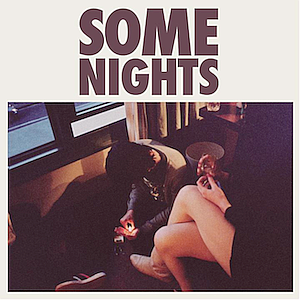
I’d consider myself a sucker for anything even remotely related to a concept album.
This is because I’m willing to grant a large amount of praise to those that can craft songs exploring an overarching theme, or create a twisting narrative that the music serves as a soundtrack for. All in all, it takes an impressive amount of planning, discipline and foresight to add theses elements to a song cycle, making them into something more than just a set of well made songs.
But for every great concept album, there are ones that tend to overreach, and this is a story about one of those.
Bless Colin Meloy’s little delusions of storytelling grandeur, but The Decemberists slip and fumble on their fifth album overall, The Hazards Of Love. What could have been a fascinating exploration of love that’s been won and lost, degenerates into a half-baked mess of stunted characters and languishing arrangements to match.
However, the album’s biggest fault seems to lie with the fact that there is too much musical similarity between these tracks. While it’s understood that musical motifs will pop up later if there is a story involved, something to ground the listener in the thick of the action and remind them of themes, nearly every track on The Hazards Of Love builds up in the same way. These tracks seem to plod along with soft acoustic beginnings, large bluesy riffs, a bridge that goes nowhere, and then a melody we heard two tracks ago. Revisiting musical melodies is perfectly fine, it’s worked for everyone from Pink Floyd to Green Day, but when Meloy uses the same melody four separate occasions with minimal change (“The Hazards Of Love 1,2,3, AND 4") he’s not grounding a theme, he’s being lazy.
Much to its detriment, The Hazards Of Love is an album that can only be appreciated in parts, which makes it difficult as each of the tracks segue into each other.
What’s even more depressing is that the quaint pop folk charm of most Decemberists albums has been replaced with Meloy’s wish to become Jack White. “A Bower Scene” begins innocently enough with tensely palm muted riffs before erupting in cock-rock bravado. There’s nothing wrong with heavy, but Meloy fails to realize his band works best with folky ramblings and quaint synthesizer lines, rather than bombastic blues swagger.
Still, not all is lost. “The Rake’s Song” is classic Decemberists, with a climbing vocal hook over held together by thick bass, enormous drums, and hypnotic acoustic guitar. Channeling the album’s supposed villain, Meloy brings a darkness rarely seen in Decemberist songs with lines such as, “Charlotte I buried after feeding her foxglove/Dawn was easy, she drowned in the bath/Isaiah fought but was easily bested/Burned his body for incurring my wrath…”
Elsewhere, “Annan Water” features a lush and spacious organ break while “The Wanting Comes In Waves/Repaid” sports angelically staggered harmonies that seem to ascend towards something otherworldly. Suffice to say, it’s not that the music itself is awful on The Hazards Of Love, but those moments of musical beauty are few and far between, and never seem to last for a full song. And while none of the music is poorly written, it just seems phoned in.
While The Hazards Of Love is musically hit or miss, what really bogs it down is how muddled Meloy’s story comes across to listeners. Sure, some concept albums require the listener to delve past the layers of loud guitar to get to the album’s nuances, but The Hazards Of Love obscures this to the point of nonsense. There should be some balance between catching the flashes of plot points without needing an accompanying lyrics sheet to figure out what Meloy is rambling about.
Essentially, The Hazards Of Love’s convoluted plot revolves around Meloy (Or William as he’s referred to in the story) and his love Margaret (Whose parts are sung by Becky Stark). Through circumstances not quite decipherable, Margaret gets captured at some point, raped at another (By Meloy’s other persona, The Rake) and falls at the mercy of a envious Queen (Voiced by Shara Worden), ultimately concluding in bloody battle as Meloy’s William attempts to save her.
If you feel like Meloy’s reaching for Rush-like ridiculousness, you’re not alone here.
While the fantastic element of the story seems to fit right at home in the form of a concept album or a rock opera, Meloy doesn’t give these characters enough time to develop, nor a sense of space for their existence. They live as absolutes, and commit actions before you can garner a good feel for them. In the end, it feels like Meloy’s love of the concept album’s structure gets the better of him, and he forgets how to tell stories, something the Decemberists have always excelled at.
But I suppose that’s the hazard of concept albums: They are a tricky beast at best, a beast that requires the right kind of love, and the right kind of restraint.
Sounds Like: The Crane Wife (The Decemberists), Consolers Of The Lonely (The Raconteurs), Wincing The Night Away (The Shins)
Key Cuts: The Wanting Comes In Waves/Repaid, The Rake’s Song, Annan Water
Click on the artwork to sample some of The Hazards Of Love for yourself!
Sunday, March 29, 2009
The Decemberists- The Hazards Of Love (**)
Thursday, March 12, 2009
U2- No Line On The Horizon (**)
 Shame on you, U2.
Shame on you, U2.
When the Irish four-piece started recording No Line On The Horizon back in 2006, they promised music fans a dramatic reinvention of the U2 sound. They made promises about expanding the “sound barrier” like they did with Achtung Baby back in ’91, and Bono shot his mouth off about Edge’s invigorating energy in the studio. In fact, I believe the phrase was “real molten stuff…” as Bono aimed to describe the guitarist’s new musical direction. Additionally, Brian Eno, Daniel Lanois, and Steve Lillywhite were all returning to help Bono and Co., the men that helped helm the classic albums U2 built their careers on.
Suffice to say, there is nothing “molten” about No Line On The Horizon.
Coinciding with album’s stark cover, fans are treated to a musical haze where U2 seem to (once again) fail at bridging the gap between their 90s experimentation and their 80s stadium anthems.
It doesn’t begin horribly though, the album’s title track invites listeners in with Larry Mullen Jr.’s exotic and shuffling beats as it ties together Adam Clayton’s pulsing bass and Edge’s airy guitar work. Unfortunately, “No Line On The Horizon” is all build up and no pay off, the song’s chorus of “No/No line on the hori-izon/No/No line…” comes off as undercooked and lazy, especially considering the three years the band spent writing and recording these tracks.
But the disc’s real fault is its slow midsection, bogged down by the laughable dance fuzz of “Get On Your Boots” and the goofy funk of “Stand Up Comedy.” While thick Euro dance beats have run rampant through U2’s 90s output, that experimentation came off as fresh and dynamic, the work of a band in control of their craft. Here, the opposite is the true. On No Line On The Horizon this musical flirtation comes across as foolish and stale, as if their sole purpose was to balance out the large number of ballads U2 had written.
And let’s be fair, there is only so much subtext you can apply to a chorus of, “Hey/Sexy boots/Get on your boots/Yeah…”
While there is a fair amount to criticize about No Line On The Horizon, U2 do hide some interesting gems within the album’s 11 tracks. “Magnificent” is the album’s true stand out, beginning with booming bass and dense electronic textures before exploding with Edge’s delicate and ascending guitar work. Aside from offering up such lines as, “I was born, born to sing for you/I didn’t have a choice but to lift you up/And sing whatever song you wanted me to…” the track finds U2 balancing their signature sound with their love for the European disco. Topped off with a wistful solo from Edge, “Magnificent” represents the potential this album could have had.
Elsewhere, the gospel tinged “Moment Of Surrender” recalls The Joshua Tree’s American music roots, while skittering beats and soulful singing grant the track a darkness U2 never achieved in 1987. Again, Edge’s layered guitar work provides the song with most of its character, but it’s Bono’s lyrics that take center stage as he laments, “It's not if I believe in love/But if love believes in me/Oh, believe in me…”
Ironically, in a track about the ultimate capitulation, U2 share something very important about themselves.
They want their audiences to buy into them being U2 so much, that it hurts.
No Line On The Horizon is the sound of U2 trapped in their ivory tower, going through the motions of being “The World’s Best Band” without really embodying that. For every frail nuance found in the sparse “White As Snow,” there is the forced arena rock of “Unknown Caller.” For every spontaneous and catchy hook punctuating “I’ll Go Crazy If I Don’t Go Crazy Tonight,” there is the forced call to arms of “Cedars Of Lebanon.” In the end, U2 never become more than the sum of their parts, an exercise that sinks the music to a snail’s crawl at best.
All of this reaffirming that U2’s last classic album will probably be All That You Can’t Leave Behind.
Sadly, U2 have become bored with being a rock band and would much rather become a concept, a symbol for something hopeful and grand rather than the actual inspiration for such. As a result, the music has become painfully methodical, to the point where self-plagiarism is mistaken as “signature U2.” Yet, I suppose that’s what the 2009 incarnation of U2 looks like, a band content with presenting a mediocrity that mimics their once vibrant expression.
For fans, there seems to be only one way to address that: Shame on you, U2.
Sounds Like: The Earth Is Not A Cold Dead Place (Explosions In The Sky), Ghosts I-IV (Nine Inch Nails), The Unforgettable Fire (U2)
Key Cuts: Magnificent, Moment Of Surrender, I’ll Go Crazy If I Don’t Go Crazy Tonight
Click on the artwork to sample some of No Line On The Horizon for yourself!
Posted by
Mike
at
7:47 PM
1 comments
![]()
Labels: Get On Your Boots, New Albums, No Line On The Horizon, Review, Rock, U2
Wednesday, March 4, 2009
Classic Videos: blink 182- Always (2004)
When I saw Mark, Tom, and Travis all on stage again at the Grammys, it touched a nerve in me. I've always loved blink 182 and I suppose it's taken me this long to really realize my musical heroes have reunited once again. I guess people can really change and get past the trivial shit that seems to pull them apart.
Here's to the new record guys, I'll pick it up as soon as it's out.
Posted by
Mike
at
8:21 AM
0
comments
![]()
Labels: 80s, Always, blink 182, Classic Videos, Pop-Punk













